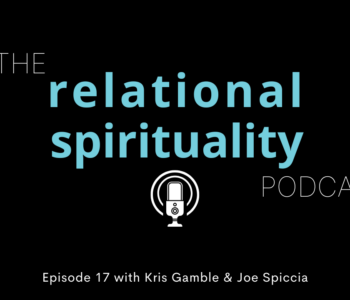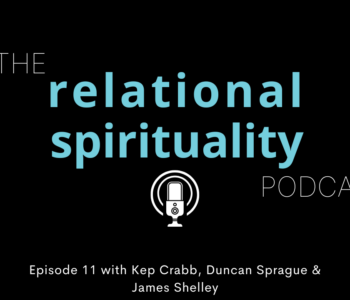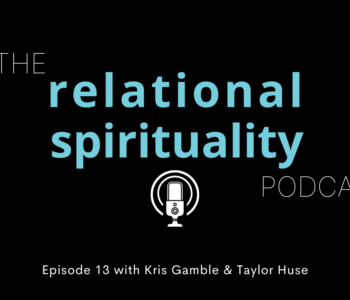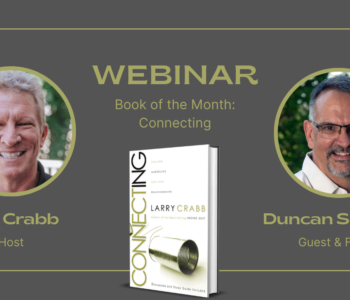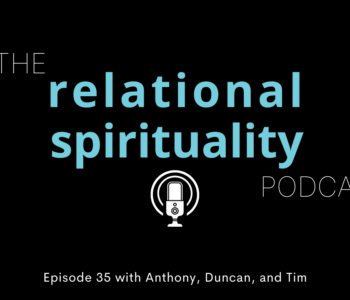 Message
Message
In it for the Long Haul | Ep. 35
Three Friends Reconnecting: The Power of a Redemptive Chat Between Spiritual Friends. Conversing with soul friends on the journey toward home.
Bios:
Anthony Vartulli – Anthony Vartuli has been gifted and called as a shepherd of God’s people, serving in various capacities over the past four decades: pastor, spiritual director, and hospice chaplain. He holds a Master of Theology degree from Dallas Theological Seminary, a Master of Biblical Counseling from Colorado Christian University, and a Doctor of Ministry in Spiritual Formation from Gordon-Conwell Theological Seminary. He is married to Diane who together have three adult children. Anthony and Diane reside in the Denver Colorado area.
Duncan Sprague- Since 2007, Duncan has served as a bi-vocational minister with International Christian Ministries (ICM), Compassion International, Cadence International, and Larger Story (LS), where he regularly contributes to LS vlogs, webinars, and podcasts. Duncan brings his passion for trinitarian-relating and relational development, along with years of rich cross-cultural experience to every person and place he serves. Since 1994, Colorado has been home to Duncan and Angie and is the birthplace of their four adult children.
Tim Burke – Tim Burke played professional baseball from 1980 until 1993. For the last 20 years Tim has been involved in sports ministry serving players in the NHL. He and his wife Christine live in Florida with their adult special needs adopted daughter.
Links:
Reading & Relating book club
Transcript
Anthony Vartuli: Welcome, everyone who is listening. My name is Anthony Vartuli. I am gratefully part of Larger Story Ministries in some capacity. I know Kep Crabb, he’s part of my small group. I’m very grateful for the work that is being done in Larger Story. This is a podcast that’s part of the Relational Spirituality series.
I was asked by Kep at some point to do one of these podcasts, and immediately what came to my mind was to meet with these two dear friends of mine, Tim Burke and Duncan Sprague. I’ll let them introduce themselves to you, but I just want to think about a question that Larry always used to ask.
Tim, Duncan, the question is, where’s your red dot? How are you coming into the time? The red dot idea, the way that Larry talked about it, was you go into a mall and you don’t know where your store is. You look on the map and you see the red dot and it says you are here. So the question is, where are you? As you come into this listening to us, where are we? I’ll tell you right now I’m excited, but if I’m to be honest, I’m a little bit nervous because we’re coming into this unscripted, this is not something that we prepared a lot for; we are trusting that the Spirit’s going to lead us in His direction as we talk about something really neat that the Spirit did among the three of us for a good three years, maybe even longer than that, with the hopes that you find something good and encouraging through what the Lord had given us and really continues to give us as friends. The three of us are friends now – soul friends – however Larry might call it. We’re friends for the journey, it’s a wonderful thing. I’m going to let these guys introduce themselves and then we’ll just jump into it, whoever wants to go first.
Tim Burke: Larry Crabb is our common denominator. He’s the one that is responsible for getting us together. Christine and I’s lives came crashing down and God put Larry right in the midst of that. I met him and he started walking with me, and then God used him in unbelievable ways. Then we became dear friends and one of the dearest times of our lives was our times with Larry. I remember the three of us and our wives at Larry’s for a Superbowl Party and I was winning.
Duncan Sprague: Not much of a Superbowl.
Tim Burke: No. Anthony was the one that had the idea of us getting together, I believe. I had no idea. I didn’t know you guys that well, but I had no idea that it would turn out to be as great and meaningful and fulfilling as it was.
Duncan Sprague: Yeah. I think all of us came into that time hungry for something. I think God had already raised an appetite for us to have a Spiritual father. I think all of us would say Larry filled a place that he was a friend, but he was also a step or two ahead of us in the ways that we were processing life. He had gone through some of his own midlife crashes and we’d gotten a front row seat to that. We watched this man walk with dignity, with humility, with some angry outbursts. It was all there. He just let us have a front row seat to it. There was something attractive about that, where I think all of us found ourselves mutually encouraged to have a man like that pour into us.
There we were February 2nd, 2014, going to watch the Denver Broncos beat the Seattle Seahawks and that didn’t happen. In fact, it was one of the most lopsided games, even early on in the game. Maybe that was a gift to us. It wasn’t much of a game and the Broncos got demolished, so we had a lot of great conversation. There was an itch that all of us had that Anthony said, Hey, we should carry this conversation forward. Do you guys have any interest in doing Saturday mornings together? And that was the beginning of a number of years of regularly getting together when we were all in town at a local Panera back in the back corner at the same place, same time every week. It was just a rich corner. I still go into that place and I can’t help but think that corner is a sacred place for me. There’s many sacred conversations that began there.
Anthony Vartuli: I look back and I can see that spot as well. When we started going – tell me if you guys would agree – we didn’t really have much of a plan, it was really more to just be together and, like what we’re doing today, just see where the Spirit would take us. I just remember the time feeling very unforced. It wasn’t something that we were trying to pull off but rather something that the Spirit was doing among us and we were together to try to discover what it was the Spirit was saying.
Tim, you mentioned something interesting about your life falling apart, and Duncan and I could definitely put words to how our lives have fallen apart in the past, and how Larry, as Duncan mentioned, had been a spiritual father to us walking us through some very difficult times.
Mine was a church that was a beautiful thing, but ended up ending really hard and difficult for me and put me into a time of transition where I just had no idea what God was doing. I was scared. I had been a pastor my whole life, I wasn’t really trained for anything else. I was finding it difficult to find any jobs at that time in my life. Providentially, I would say this group between the three of us started and it felt like God was going before us and it was truly a gift. You guys continue to be a gift of course, to me, and I know the feeling is mutual, but I always just sensed that He was going before us, and what a sweet gift it’s been for a long time.
Tim Burke: It was. When you think back on it, we all went through difficult stuff financially and with jobs and kids and all sorts of things. I think what made it special was what you said Anthony, we had no game plan. It was just, you know what, we’re just three guys, we love Jesus, and we haven’t figured this life out yet, but let’s just get together. Then the Lord just takes it from there. Every single time out of the countless times we’ve gotten together, I would walk away so much more encouraged, so much more hopeful, more full of life. It just stirred the Spirit in me to where it’s, you know what? I can make it. I can keep going. Anthony’s doing it. Duncan’s doing it. We’re going through these hard times and God keeps doing whatever He does. I always walked away encouraged.
Duncan Sprague: I think there was a change. My red dot when we first started getting together is different than my red dot now when I get together online with you two. All day yesterday, we had difficulties trying to get on and I was so frustrated after we got off. I was going, why didn’t that work? We have to give this gift of our friendship to the world. Then I thought maybe that was its own pressure to do something, show something. I thought God just gave us a gift. We haven’t chatted together in a year, maybe longer. Tis is what I love about friendships like this. You pick right up and you just keep going. You know that a whole year has gone by and we haven’t tracked with each other, but there’s something about walking with somebody below the surface, under the waterline, where you go, I know this person’s soul.
As I look at the screen, I’m looking at two friends now. When we first started meeting together, I thought, this is my friend Anthony Vartuli. Anthony and I go way back, to graduate school with Larry. He already had a master’s degree coming into it. I was going after my first, and then he kept going. He went on, did a doctoral piece, and I’m sitting there going, my friend is smart. He’s read a lot of books, he’s written some. My red dot then was, I have to be impressive with my friend. I was more concerned about being impressive than being a friend. That was the same pressure as yesterday. I wanted people to be impressed with the three of us.
I love that right now, Larger Story is doing the book of the month is SoulTalk. I just went back through it. Tim, your story is in that book and it’s Larry talking about his red dot as he meets with you. He tells some of your story. You’ve been at the top of your career, as high as you can go, a pitcher in the National League. I remember thinking, oh man this guy has really achieved something. The pressure when we first started meeting… Larry, I love the way he describes his red dot in getting with you. Larry says, I’m pretty good with words. I wonder if I can zing a few past him and get him to strike out on me. You just see the pressure.
Anthony Vartuli: I remember that story.
Duncan Sprague: I love the fact that now as we get together, I don’t see my former pitching friend and my highly educated friend. I see my friends. There’s something that God does in a community, a band of brothers, a band of sisters, when real life gets shared all of a sudden. I work with military ministry as one of the things I’m doing. At some point, the stripes come off the arms and the rank and everything comes off. All of a sudden we’re all standing at the foot of Jesus and it’s level ground. That’s what I loved with what Larry created a space for. He just was not that enamored with titles and positions and things like that.
My red dot now is I’m spending time this morning with two of my close friends and I can’t wait for the world to see that these are my friends. I think of Paul, I think 82 names are associated with him. Paul and Barnabas, Paul and Timothy, Paul and … I sit there and go, if somebody ever tells the gospel according to Duncan, they’re going to see Duncan and Tim, Duncan and Anthony. These are going to be front row folks that I did life with. We’ve never done ministry externally together, but none of us would be doing the ministry we do apart from the ministry we do internally with one another. So that’s where my red dot stirs me.
Tim Burke: I love that.
Anthony Vartuli: That’s great.
Tim Burke: It’s funny, you were talking about life falling apart and transition and all this stuff. I remember through tough times with you guys, it was back 2014 when we started. The three of us went through difficult times together, all of us. They were just difficult times.
Now I am in a transition in these next few months. The Lord’s going to have to figure something out with me. I’m in the hockey world and walking with hockey players and stuff, but my role is being handed over to a hockey couple. It’s a step up, it’s a step forward, but it’s hard on me financially and all this stuff. The Lord’s going to figure it out. I remember going through this in 2015 with you guys, and I am much more on solid ground nowadays. I’m prepared to go into this knowing, Lord, I’ve seen you do this so many times in our lives and others’ and Antohony’s and Duncan’s. He’s going to do something. I know it. His track record is crazy. In two days from this taping it is going to be our 41st birthday. Christine and I came to the Lord 41 years ago, August 25th.
Anthony Vartuli: The two of you came to Christ together, at the same time?
Tim Burke: Yeah, that was awesome. In the minor leagues in Buffalo, New York. Buffalo, that’ll drive you to the wall.
Anthony Vartuli: No offense to anyone who’s from Buffalo listening to this.
Duncan Sprague: My son is getting ready to move up to upstate New York, so I’ll make sure that he hears that.
Tim Burke: I was just thinking while you were talking, Duncan, I’m going to have times of panic, but I’ve seen Him work so much over my 41 years of knowing Him. He’s been at work a lot longer than that. His track record goes back thousands of years to eternity past and He’s been flawless. It doesn’t mean it doesn’t come without hardship, but it’s going to be okay. I think through those times, the three of us together, I’m feeling some good fruit from it right now, just from coming into a transition time, it just feels different than it did back then. And that’s really cool.
Anthony Vartuli: You say you feel like you’re on solid ground, can you say more about that?
Tim Burke: I feel like I don’t know what the Lord is going to do. I’m not sure how this is going to work out. I have no answers, no possibilities. We have to wait two more years untill I can get to social security time. But the Lord, He just knows. He does it. He loves us, He cares, He will do something. It’s exciting too, because it hasn’t kicked in yet. I’m still getting paid a little longer. It might change in the next month or two, but I know that He will do something and it’ll be so odd. It’ll be so weird that it will be obviously from Him and then Christine and I will sit back and go, Lord, you are incredible. That’s what it’s all about.
Anthony Vartuli: As you’re talking here I’m remembering a couple of things. One, Duncan, how ironic you would talk about how you felt about us when we first were meeting. I truly did feel intimidated by the two of you. I felt in some ways, I was lagging behind. Maybe that was true in some ways, but as we continued to meet, I would say the same thing you said, Duncan, we truly became brothers. I’d use this word to describe both of you and that is an increase in solidness that I see in both of you guys that comes from dealing with very uncertain times in the middle of the uncertainty. I was just reading this in one of Larry’s books, When God’s Ways Make No Sense. He talked about three different ways of approaching life. You’ll remember these.
The first one is resistant run, which comes from Jonah. The second one is distort and deny, which was Paul before he was converted. And then Habakkuk, which was tremble and trust. It felt like when we were together, we were learning that third way of being trembling and trusting because we were all dealing with job uncertainties – that’s just so difficult on a man in general – and the three of us had been ministering for years and then hit with uncertainties like that.
What does it mean to tremble and trust? I felt like we did this together. We felt the freedom to really struggle in the present moment together. A lot of times what happens in groups, at least groups that I have been in, there’s no place for present struggle. You can talk about past struggles, but to be able to talk about present struggles being resolved and then have that response be one of safety and not people trying to fix you or give you advice or throw some Bible verses at you. That just was such a blessing to me to be able to freely struggle in the present moment and really learn. I’m still learning; trembling and trusting. There’s things I’m facing today that feel uncertain and, just having the freedom to tremble about it and tremble about these things and then the trust comes as well, but I think that was one of the gifts of our time together and it lingers today.
Tim Burke: Yeah. I think that left on our own, we’re going to tremble longer before we trust, but when we’re walking together, trust comes hand in hand when we’re walking together and we’re in it together. I know Anthony struggled with this stuff and Duncan, I know he’s working, having to redo bathrooms and all this stuff while doing his ministry and trying to fill in the gaps and it’s hard but we just remind each other of God and Him being in the midst of our lives. Every time we got together, it was a perspective fixer, because if I focus on myself too long, my perspective is going to be off. That’s all there is to it. But when we get together, I go, oh yeah, God, I remember Him, I forgot about that guy.
Anthony Vartuli: Oh, yeah. God.
Tim Burke: Oh, my gosh. He is actually bigger than my problem and He loves me. When we’re together, then trust comes out of the tremble.
Duncan Sprague: Yeah. There were plenty of times when we borrowed trust from one another because we go, I don’t have it in and of myself. I’m too weak right now and I’ve got blinders on. I’m not seeing the bigger picture. Part of getting together was confessing our sins. Sometimes it was the sin of, I’m just willfully not seeing God in the middle of this. I’m willfully choosing to cling on to my own control, my own management, my own whatever.
I love, Anthony, that you brought up the idea that what keeps us from trusting is also a refusal to tremble. I often wonder, what keeps me from trembling in the middle of this? It’s my own self confidence. I can handle this. A real man would deal with this. There is a sense in which, even my red dot with you guys, I was intimidated by what you had done, thinking that somehow God was super impressed with what you guys had done because I was, but then to realize that God is not impressed with the same thing.
You said don’t quote Bible verses, but the one that does come to mind is about trembling, and it’s what I think that God will esteem us doing great things. At the end of Isaiah, He rebukes Israel for thinking they had done a great thing. He says, listen, guys, heaven is my throne and the earth is my footstool. Where’s the house that you can build for me? They think that He’s going to be impressed by building a great monument for Him. He says, this is not what I esteem. I don’t esteem the great accomplishments. This is the one that I esteem, or the one that I lift up, the one who is humble, and who is contrite, and who trembles at my word. I think that’s what we learned together. We learned what humility looks like in the middle of when all of us faced job and career shifts, transitions while we’re in the middle of it.
I call it my midlife crashes, where all of a sudden we lose a step. We got younger people who think faster and are quicker on their feet, taking our jobs. Instead of seeing them as competition, stepping aside, I love what you just said, Tim, about this couple that’s coming in. Oh, it’s an upgrade. You’re saying, I want to launch them. I don’t want to stand in their way. I don’t want to do a Saul thing with David. I want to launch them into what God has called them to and see my transition is shifting that now in the season that we’re all in entering right now is we are in a season of launching others. It’s no longer about our accolades, no longer about us getting our name on the billboards and things like that. I have to die so that someone else can live. And God has gifted us to be encouragers. We got enough old men out there who are saying, “Oh, this generation that’s around right now? Oh, man. Problems? In my day…” Instead of doing that we get to be those who are launching a new generation saying, keep going for it. Tim, you always, at some point in all of our times together, you’d always say the same phrase. You know what I’m going to say?
Tim Burke: Yeah.
Anthony Vartuli: Yeah.
Duncan Sprague: Go for it.
Tim Burke: We’re still here.
Duncan Sprague: That’s it. We’re still here.
Tim Burke: We’re still here. We would have such difficult times and we didn’t see answers or anything. And then maybe we don’t see answers the next time we get together, but it’s Hey, here we are, we’re persevering, we’re pressing on, we’re maybe not enjoying it, but dang, we’re in this together. I found a lot of encouragement in that.
To change the subject, I just thought of something. I’m encouraged so much these days by something Duncan, you and Anthony talked about early on in us getting together that I had not heard before. I think it goes back to Larry or something, but Isaiah, where it says we’ll soar on wings like eagles and then run and not grow weary and then walk and not faint. Maybe it was Larry’s interpretation, how did you word it? It’s kind of the evolution of life.
Duncan Sprague: Yeah. The crux of it was, I was preaching my last message at a church years ago that imploded and I ended the message by saying do you want to rise up on wings like eagles? Wait on the Lord. Do you want to fly like an eagle? I can’t remember saying that, but my whole vision at that point was that the goal of the Christian faith was to rise up on wings like eagles. Afterwards, Philip Yancey was part of our congregation, and he walked up to me. All he said was, you do know there’s more to that passage, right? That’s what caused me to pause and I went and reread it. A few weeks later, we were at a mutual friends’ house. I said, do you think Isaiah is giving us a glimpse of what it means to transition through life through the soaring years? We’ve all had soaring years. The young men who leave the nest and go out and find their wings and soar. Then we have our running years, and that’s when our wings get clipped and we’re no longer soaring. Now we are on the ground running through the trees, but we still have the energy to run, and we’re running hard. There’s just more obstacles in the way. Some people call it midlife crisis, I call it midlife crashes. All three of us have had doozies of midlife crashes. And now all of us are transitioning into that last stage where we are walking with the strength not to pass out.
The thing that I love is, when you say, we’re still here, Larry said, I want to make sure that we say this at my funeral. The thing that he hoped would be said is he never quit. And it’s the same idea as we’re still here. We’re not quitting. Paul would say, we are not those who shrink back. That’s the thing that I see in both of you, you’re not men who shrink back. I needed men who were leaning into the transitions like you are right now, Tim, leaning into them going, we’re coming into our walking years and I want to make sure we’re walking in love. I want to make sure we’re not walking as grumpy old men. We’ve got enough angry evangelicals out there who are complaining about this generation and all the divisions. I want to see old men and women who are finishing well like Larry did, and that was said of him. Finish without quitting.
Anthony Vartuli: I actually remember another thing that Tim said. Before I get to that, were you going to say more, Tim, about that progression?
Tim Burke: No, that’s what I was thinking. Finishing well. That’s what we really want to do, the three of us. And we’ve helped each other along the way. But we still need each other and the Lord, or I know I won’t finish well. Christine is amazing with us walking together, her and I. And it’s not guaranteed. There’s too many examples in the Bible of guys that were pretty dang awesome. But they didn’t finish well.
Anthony Vartuli: I know that our wives were very encouraged by the time that we had together and they were like, go, be with these guys. You’re going to gain some perspective. You’re always going to come back, like you said, Tim, a little more encouraged.
I will tell you one of the things that the time did for me. This was just a slow progression, but what a gift this was. I had pastored for so many years, 27 years, and I was so used to wearing that hat of Pastor Vartuli. I’m a chaplain now, I do hospice work, but back then it felt like I needed a title. I needed something to describe who I was. The Lord graciously did wonderful things while I was a pastor. I have a lot of gratitude from when I worked in the churches. But the Lord really wanted to get down to something deeper than that. He wanted me as a person, as Anthony, to emerge. And over that period of time meeting with you guys, I believe that really happened more. Today, yeah I’m a chaplain, but I really don’t care about that title. What I care more about today is just meeting people as Anthony and allowing, as the Spirit permits, to speak about the struggles that are going on in my life, if appropriate to speak about, and to speak about the incredible ways God is moving in my life and just meet soul to soul.
I think it was probably providential that we didn’t get on yesterday. Maybe we were all needing to be more prepared by the Spirit. But even now, as I talk to you guys, I feel like this is soul to soul, this is very incarnational. I could weep about it really, to think about, just the gratitude I’ve had for you guys. Duncan, like you said, we’re picking up where we left off, but to think that the Spirit right now is with us, right in this moment, as we’re talking, is an astounding realization. To believe Father, Son, and Spirit eavesdropping in on the conversation and doing what they do best. To redeem us, to instill courage in us. One thing I remember you saying, this was at a particular time we were meeting Tim, you said something like, how much time do we really have left? Maybe 15, maybe 20 years. We can do that. We can do it. And we laughed so hard.
Tim Burke: We got a lot less now than we did
Anthony Vartuli: Yeah, exactly right. By God’s grace, we have 15 or 20years. We’ll see, that’s up to the Lord. But I just remember thinking, that’s so true. We can do it. We’re struggling hard, but we can do it. There’s a better day coming, and the best is yet to come. I think we said that a lot together. The reality of that reality that heaven is coming gives us strength and courage to move today, in whatever the Spirit wants us to do.
Tim Burke: YeahThe difficulties that we’re going through now, this is the last time in all of eternity we’re ever going to go through these. 76 is the average age a man dies. I’m 64, that’s 8, 12 years. I’ve got 12 years of hardships and getting to see the Lord in the midst of that doing whatever He does, but it’s just 12 years of hardships. Even if it’s just really brutally brutal. 12 years and then I got Eternity. We can do that. We can do it.
I just think, here’s another thing. You two will get it. You guys watching or listening to the podcast, you won’t get it because you don’t know me. Two weeks ago I had to sell my motorcycle.
Duncan Sprague: Oh no.
Anthony Vartuli: Oh my gosh.
Tim Burke: See, those reactions tell it all. I loved my motorcycle for 30 years. My wife bought me a Harley when I retired from the major leagues. And so for 30 years, I’ve just had a love affair with the bike. God meets me on the bike. I have great times. It’s incredible. But, I had to sell it financially and stuff. Two weeks ago I sold it, and Christine wanted to talk to me about it the night before I took it in, and she asked, how are you doing, and stuff, and I just said, I can’t even talk about it, I just don’t even want to talk about it. I didn’t, and then I went to bed. Then I got up, got on the bike, and went to the gas station. I got a 45 minute ride to the dealer and I got on the bike and immediately God took – you guys are caught up on The Chosen and watching The Chosen?
Duncan Sprague: Sure.
Anthony Vartuli:Yeah. Yeah.
Tim Burke: It’s incredible. Anyway, the last episode of season three focuses on Psalm 77, part of it. God just took me right to that where it says – it’s just so cool the way they do it in the show – I will remember the deeds the Lord has done. As soon as I got off the bike at the gas station, that popped into my head. I was so sad and bummed, but then that popped into my head. And then all of a sudden I’m thinking about 30 years of my bike and my experiences riding through every Rocky Mountain Road in Colorado and loving it, and being around in Tennessee and the Natchez Trace Parkway, all these different experiences.
Anthony Vartuli: I always love the stories.
Tim Burke: I was overwhelmed with thankfulness for having what I had for 30 years. I just let the Lord just go and he just took me through all these memories, and I was just thankful. I remembered that was a gift from God that I had; an unbelievable, passionate gift He gave me.
I got there and did the transaction. Christine and Nicole came 15 minutes later and picked me up. So I get in the car and Christine goes, how are you doing? I said, you know? I’m pretty good. I am thankful. I’m telling you, I would not have had that perspective in 2014, 15, 16, 17, when we were meeting you guys. I wouldn’t have done that. But God has brought me to a point where He made even selling my bike okay. You guys can understand that. Even since then it’s been like, great, it’s okay, no problem, that’s where we’re at, and that’s growth. We’re going to make it through.
Anthony Vartuli: I’m going to tuck that one away and hold on to it, because I know how meaningful the bike, motorcycle was for you. Just to hear you talk about it feels like trembling and trusting.
Tim Burke: It just blew me away. It still blows me away. God, you did that, you made it okay. We’re going to make it, we’re going to be okay. But when you see a solid example of growth, that’s something God did. Yeah. And man, we wouldn’t have been able to do that 10 years ago.
Duncan Sprague: The thing that that strikes me is, it’s not the last time that any of us are going to do that. We’re going to take a lot of things that we have valued in life and we’re going to say, thank you for the season, Jesus, this one is yours. Horrors that come our way, we may do that with wives, with children. They may do it with us, where we go, thank you for the season and help me in those transitions the same way every other transition you walked with me. If Tim said, we’re still here, Anthony always said, the best is yet to come. The truth is, that’s real because of the hope we have in Jesus. Tim, I have one request. The first ride in heaven, I want to go with you because we never had a ride here on earth.
Anthony Vartuli: Duncan loves motorcycles as well.
Tim Burke: Absolutely, yeah. Tose roads are going to be streets of gold, that’s going to be fun.
Anthony Vartuli: I’ll be riding on some angel or something like that. You guys can be on heavenly motorcycles.
Duncan Sprague: Is that the brand?
Anthony Vartuli: Yeah, who knows what the brands are? Boy, we’ve gone 45 minutes. I would love to…
Tim Burke: Take a break and then go another 45?
Anthony Vartuli: We could easily, right?
Tim Burke: We’ll have to do that off camera.
Anthony Vartuli: This is so wonderful.
Duncan Sprague: We’ll do it again.
Anthony Vartuli: I guess I want to ask you guys one question. What would you want to say? What would you want to leave the people who are watching, who are longing for something like what God has given us? What would you want to leave them with? What would you want to say to them? If anything at all.
Duncan Sprague: I have an immediate thought. In a world of isolation, do life together. Find friends, spiritual friends, mentors. Don’t abandon relationships, that’s the easy way out. Larry’s commitment was to a relational revolution, that we would find radical discipleship through relational risk. And that’s, I think, what we’ve experienced and that we’re richer because of it. We’ll go to our graves – Larry always said, I want to go to my grave without any secrets. You guys carry secrets of mine so that I don’t carry them alone. Don’t live in a world of isolation. Do life together. That’d be my thought.
Tim Burke: Yeah and like I said, when we got together, my perspective changed. It didn’t change when I was just sitting there by myself. I’ve known myself for a long time now. I can’t trust my perspective. It changes and shifts. But with other people, it’s a lot easier to get our perspective back where He wants it when we’re with other guys. I always equate it to, the Holy Spirit is in me, He’s in Anthony, He’s in Duncan, but sometimes, a lot of times, I’m just by myself, and so the Holy Spirit is just sitting there and He’s not getting stirred up. But then, all of a sudden, the three of us get together, and maybe the three of us are just caught up in life, and the Holy Spirit’s in us, but it’s just sitting there, and it’s like chocolate milk and some chocolate syrup at the bottom of a glass of milk. We get together and then all of a sudden we’re encouraging each other and it starts getting stirred up and then the chocolate gets mixed in with the milk. And now all of a sudden it’s like it’s full and that’s what happened time and time again. And it will happen whenever we get together with other men that are wanting to finish well and to press on where we’re at now.
Anthony Vartuli: I appreciate it guys. The thought that comes to my mind is very much along the same lines as what you guys just said. I don’t know if this is Eugene Peterson, whoever it is, such a good quote. We cannot be ourselves by ourselves.
Duncan Sprague: That’s right.
Anthony Vartuli: The Trinity is a relationship of three: Father, Son, and Spirit. We are made in the image of God, which means we are made relational.
Duncan Sprague: That’s right.
Anthony Vartuli: We walked relationally together. We would all use that word. We walked relationally and still walk relationally together. And that doesn’t mean it was always easy. There were awkward times…
Tim Burke: I think there were more hard times than good times that we were going through back then, but even in the hard times, it was okay. Something good came out of ’em. I love that. I wouldn’t have wanted to get together with you guys if we all had our lives going great. It wouldn’t have been as thrilling.
Duncan Sprague: I wouldn’t have fit in.
Anthony Vartuli: Guys, we could go on and on, but I think we need to stop here and let the Spirit do what He wants.
Tim Burke: Thanks Kep for all you’re doing.
Anthony Vartuli: Yeah, thank you Kep, and thank you Larger Story, and thank you for all the people listening.
May the Spirit of God do whatever He longs to do in your life, and may you trust Him to do it. Thank you, and take care.
Tim Burke: Thank you.
